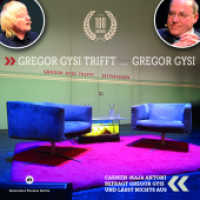- ホーム
- > 洋書
- > 英文書
- > Psychology
Full Description
The stories we tell of our own lives and those of others help us make sense of the world and establish meaningful social connections across space and time. Pandemic stories similarly can shed light on the emotions, relationships, values, and actions that arise in times of crisis and disruption.
This book examines how COVID-19 narratives function as models of sense-making, how they connect public and private life, and what they make possible in social worlds. It emphasizes the little heard stories of those struggling with the pandemic's effects, featuring stories from across the world found in literature, social research, media, public health, and science. In doing so, it provides insight into the inequitable social burdens associated with the COVID-19 crisis.
Designed to demonstrate the richly nuanced insights that narrative inquiry can produce to understand COVID-19, Crisis, Inequity, and Legacy explores the way in which pandemic narratives are used to create the shared collective memory and cultural legacy of the pandemic. The volume expands the critical frameworks through which emerging COVID-19 narratives - experiential, literary, scientific and their hybrids - can be known, examined, and understood.
With contributions from scholars working in Africa, Asia, Australia, the Americas, the United Kingdom, and Europe, the volume furthers dialogue on the pandemic across geographical, cultural, and social diversity and considers how COVID-19 intersects with privilege and inequity in diverse social circumstances. It problematizes perspectives on the pandemic that reduce it to a global monolith or unhelpful North-South comparisons. It reframes the narrative that centered technocratic expert knowledge and a mobilizing emphasis on fear and sacrifice while discounting other values and ramifications.
This volume uses narrative to provide forms of evidence, self-reflection, and shared understanding for building more equitable and just post-COVID-19 futures.
Contents
1: Silvia Camporesi;Sanny Mulubale;Mark D. M. Davis: Researching COVID-19 narratives
Part 1. Power and narrative resistances
2: Hanna Meretoja: Master and counter-narratives of COVID-19: Ali Smith's Summer, Elizabeth Strout's Lucy by the Sea, and the complexity of lived experience
3: Corinne Squire: Curves and numbers: Dominant and counteracting narratives of the early COVID-19 UK pandemic
4: Monique Lewis;Eliza Melissa Govender;Eli Skogerbø: 'Living with COVID' government narratives: South Africa, Australia, and Norway
5: Trisha Greenhalgh;Mustafa Ozbilgin;David R. Tomlinson: How COVID-19 spreads: Orthodox narratives, heterodox narratives, and social dramas
6: Martha Lincoln: From 'in this together' to 'a winter of severe illness and death': Narrating national pandemic outcomes in the United States, 2020-2023
Part 2. Intersectionalities and temporalities
7: Floretta A. Boonzaier;Simone Peters-Mazibuko;Ivan Munashe Leigh Katsere: Narrating intersectionality: Migrant HIV positive women's narratives of living and surviving in South Africa during the COVID-19 pandemic
8: Lisa Fitzgerald;Allyson Mutch;Christopher Howard: Living 'positive' through the COVID-19 pandemic: A qualitative longitudinal study investigating how older people living with HIV experienced the first wave of the COVID-19 in Australia
9: Md Abul Kalam;Shahanaj Shano;Ranjan Saha Partha: What do COVID-19 measures mean to those on low incomes in Bangladesh?: Lived experience, reciprocity, and inequity
10: Deborah Lupton: The sociomaterialities of COVID life in Australia: Insights offered by narrative case studies
Part 3. Epistemic justice and reconciliation
11: Erica Masserano: Lockdown stories: Collaborative life writing and intergenerational relationships in the London CityLife project
12: Francisca Stutzin Donoso: What can the lived experience of chronicity teach us about long COVID?: From illness narratives to structural injustice in chronic disease
13: Ilana Löwy;Jean Segata: Storytelling through long COVID: Shaping a disease with patient testimonies in the US, UK, and Brazil
Part 4. Conclusion
14: Sanny Mulubale;Silvia Camporesi;Mark D. M. Davis: Valuing pandemic narrations: Analytical plurality, the COVID inequity crisis, and narrative ethics








